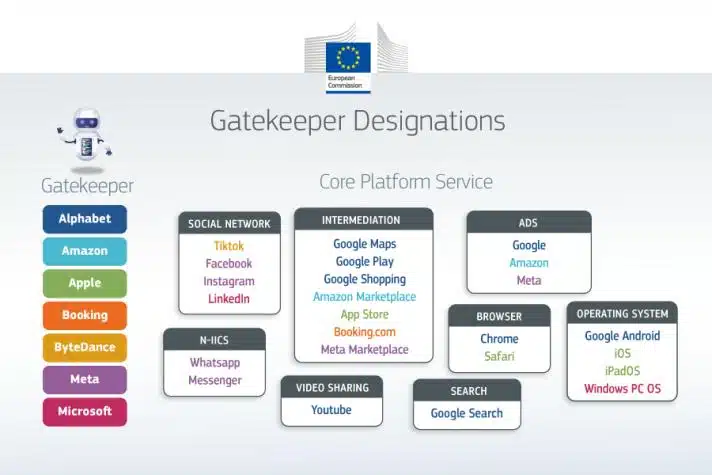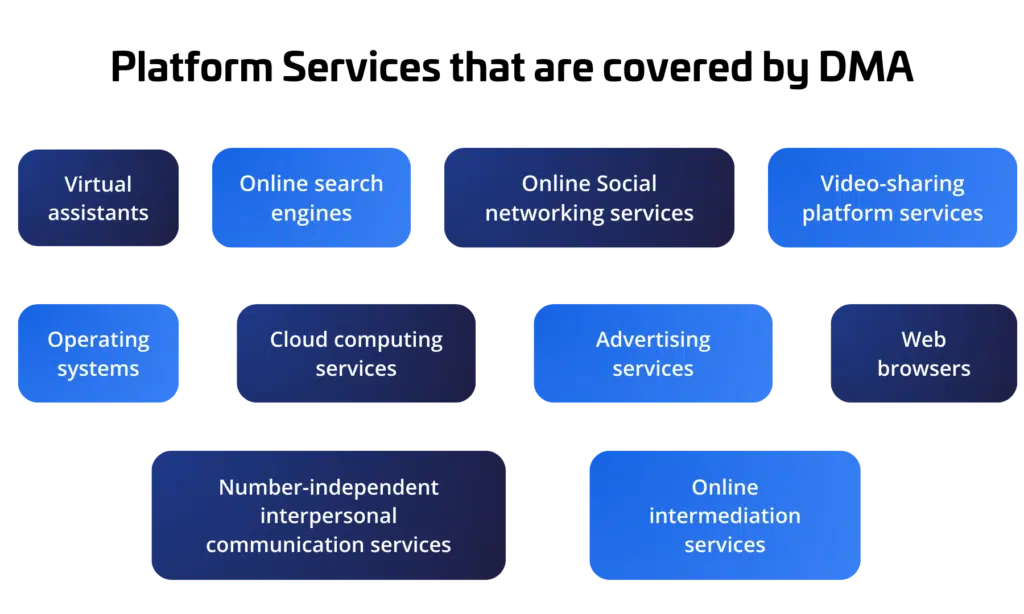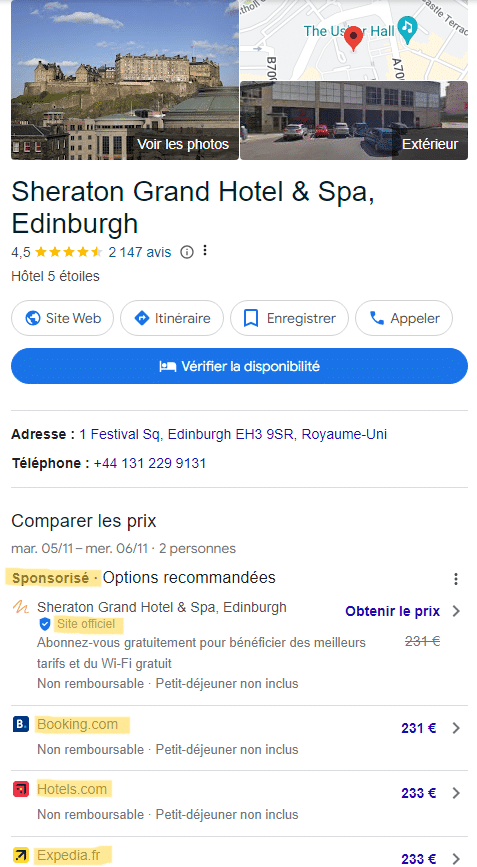What’s the Digital Markets Act (DMA)?
The Digital Markets Act was launched in 2022 within the European Union as set guidelines for these known as ‘gatekeepers’ within the digital world. They function essential ‘gateways’ for companies to achieve their finish customers. The DMA goals to guard companies and finish customers from doubtlessly unfair circumstances and make sure the transparency of essential digital providers equivalent to apps and adverts. The desk beneath demonstrates the principle standards for who might be labeled as a ‘gatekeeper’. The European Fee is an assessing physique that determines which corporations fall beneath the Act and is classed as ‘gatekeepers’. At this stage, solely corporations which have been designated as gatekeepers are topic to obligations. The presumed gatekeepers are in a position to attraction and supply arguments and proof that, as a result of distinctive circumstances, they shouldn’t be thought-about as gatekeepers although they meet all the factors.
Supply: Bloomberg, 2024
Who’s at present affected?
Since September 2023, seven organisations to this point have been recognized as gatekeepers by the EU Fee, that are:
- Alphabet (Google)
- Amazon
- Apple
- ByteDance (TikTok)
- Meta
- Microsoft
Additionally designated beneath the DMA: Reserving, designated by the Fee as a gatekeeper for its on-line intermediation service Reserving.com on 13 Might 2024.

Supply: European Fee, 2024
The DMA will impose quite a lot of obligations that the gatekeepers might want to adjust to and incorporate into their every day features. One instance of these obligations is to permit the tip customers to uninstall any pre-installed apps on their units, or change their default settings on their working methods, digital assistants, or internet browsers that steer them to the gatekeeper’s services and products and supply selection screens for key providers. One other instance is to permit enterprise customers to advertise their presents and conclude contracts with their clients exterior the gatekeeper’s platform (European Fee, 2024).
Supply: European Fee, 2024
Why is the DMA essential information to hoteliers?
Reserving.com is an On-line Journey Agent (OTA), and its providers are extensively utilized by hoteliers to achieve new and present clients. The favored lodging reserving platform Reserving.com has been recognized as a gatekeeper after submitting its self-assessment on 1 March 2024, based mostly on the DMA standards. Following their designation (Might 2024), Reserving.com might want to adjust to the regulation inside six months and submit an in depth report outlining the DMA compliance. Listed here are some key necessities:
- No Price Parity Clauses: Reserving.com should permit accommodations to supply decrease charges and promotions on their very own web sites, which suggests they’ll not implement price parity clauses.
- Honest Competitors: Reserving.com might want to make sure that its platform doesn’t unfairly favour its personal providers over these of opponents.
- Transparency: The corporate should present clear and clear info to each customers and enterprise customers in regards to the phrases and circumstances of its providers.
- Knowledge Sharing: They might want to permit accommodations to entry the information that they generate of their use of Reserving.com.
Our analysis reveals that with For-Sight’s CRM and Advertising and marketing Platform, accommodations can cut back reliance on OTA’s by, 19% on common. Reserving.com will now be liable for making your visitor contact particulars seen to you. Many accommodations didn’t have entry to sure assets, however with the DMA controls, accommodations within the European Union now do. To benefit from it, hoteliers have to have ”all knowledge in a single place” CRM platform the place they’ll mechanically create buyer profiles based mostly on the contact particulars and interactions with the lodge.
What’s the affect of the DMA on Google Search and its significance for hoteliers? 
Initially, the DMA aimed to create a fairer digital market by curbing the ability of main on-line platforms like Google. Nonetheless, in response to D-EDGE findings (June 2024), the adjustments have had unintended penalties for accommodations:
- Decreased Natural Site visitors: Natural search outcomes for accommodations are actually pushed additional down the web page, resulting in a 20% drop in natural site visitors to lodge web sites.
- Elevated Paid Site visitors Dependence: Accommodations are seeing a surge in paid site visitors and income, making direct distribution dearer.
- Greater Distribution Prices: The visibility of On-line Journey Businesses (OTAs) has elevated, whereas accommodations face larger prices for direct bookings.
Within the image on the suitable, you possibly can see search leads to French Google for the Sheraton Grand Resort & Spa in Edinburgh. We’ve got highlighted the ‘sponsored’ content material, which is seen first, together with the official website as the highest end result. It reveals that Sheraton Grand Resort has paid for promoting, and Google ought to now favour the official websites (additionally by including a blue badge) over OTA’s like Reserving. If Sheraton Grand Resort didn’t do Google Adverts, their outcomes would seem first AFTER all of the sponsored websites; it may seem, as an illustration, as quantity ten in complete on the listing, which means that it most certainly can be invisible to the shopper.
We anticipate additional adjustments because of the DMA laws and can maintain an in depth watch to replace our clients accordingly.
What in regards to the UK?
The UK is following the EU’s instance of the Digital Markets Act and planning to implement its personal Digital Markets Competitors and Customers Act (DMCC), which has acquired Royal Assent.
In line with GOV.uk (2024):
- The Act will give the UK’s competitors regulator instruments to cease expertise companies with strategic energy from misusing their place to drawback opponents and customers.
- The legislation may even create penalties for merchants that break client safety legislation and permit the Competitors and Markets Authority to implement client legislation instantly.
- Beneath the principles, it is going to be simpler for customers to handle subscriptions by offering clearer pricing, banning pretend opinions, and giving customers higher management over what they buy on-line.
Just like the DMA, the affected corporations (with strategic market standing) might be chosen based mostly on set standards and by the Competitors and Markets Authority. Within the case that corporations don’t comply inside a set timeframe, they might be fined thousands and thousands of kilos. The DMA enforces the identical guidelines for all gatekeepers, whereas the DMCCA permits the Digitak Markets Unit (DMU) to create particular guidelines for every agency. This flexibility could result in extra focused necessities, however may additionally decelerate the method and make it extra open to challenges (Osborne Clarke, 2024). Organisations are but to be recognized beneath the brand new Digital Markets Competitors and Customers Act.
What’s subsequent?
Wish to study extra in regards to the DMA and DMCC? We’ll organise a webinar for hoteliers to dive deep into the topic. The dates might be introduced quickly. Wish to be up to date on the webinar dates and instances? Join our e-newsletter immediately!

—
This put up initially appeared on the For-Sight weblog right here and is reproduced with their permission.

















